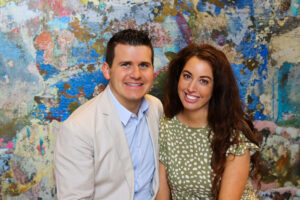Not everyone likes to take risks. Some people see risks as a great way to ruin a good thing, while others feel like their day is ruined without some risk. Those differing viewpoints can be a challenge when you’re married. If your spouse doesn’t have any risk tolerance and you get all fired up by finding “the next great idea” you may want to invest in a kickboxing class or Advil.
Megan and I differ in our level of risk tolerance. Quite a bit! But we have devised a healthy way to honor both of our natural instincts. Understanding our Money Personalities was a game-changer for our marriage.
If you’re one of the 350,000 people who’ve taken our FREE online scientific & confidential Money Personality Assessment, you know your Primary and Secondary Money Personality. (If not, take it HERE.) You also know one of the five Money Personalities is Risk Taker. And I (Taylor) am a Secondary Risk Taker. Megan’s Secondary is the exact opposite, Security Seeker.
Sound like fun? It actually is!
I loved that I ran across a Forbes article lately that totally reinforced the value of taking risks. So, of course, I showed it to Meg and she loved the article too. Not every financial expert will celebrate the value of risk-taking. Most financial people want to praise the Savers and shame the Risk-Takers. Not us.
How many inventions or businesses exist because someone played it safe? We love Risk-Takers!
The Forbes article entitled, Take A Risk: The Odds Are Better Than You Think, shares various studies that show how your life (and we think, marriage) can be improved by living life a little more “on the edge”.
We know Risk Takers – and their spouses – profit by learning from successes and almost-successes. (We don’t call them “failures”.)
Also, we encourage each other and you to think of those risks that didn’t quite go as planned as valuable. You learn from them and you didn’t limit your ability to succeed by not trying at all.
We love how the “Take A Risk” article offered,
Questions to ask yourself to get yourself ready to take a risk:
- What would I do if I were being more courageous?
- How will inaction cost me one year from now if I do nothing?
- Where is my fear of failure causing me to overestimate the size of the risk?
- Am I underestimating myself and holding back from taking risks?
What’s the worst that could happen? That is a great question too.
When presented with an opportunity (or risk) ask yourself, “What’s the worst that could happen?” If total devastation is a realistic answer then reconsider, otherwise be honest about the size and effect of possible success or almost-success.
When we were first married my desire to take risks made Megan crazy. It scared her and caused her to worry. And every time I came up with an idea that she shot down out of fear, it frustrated me. We knew we needed to honor both of our natural personalities and identifying our Money Personalities helped us do that.
I remember wanting to buy a piece of property to flip (within just a few minutes of finding out about it.)
I couldn’t wait to tell Megan about this great opportunity.
Now, I won’t say her face didn’t show her concern, BUT to her credit, she saw my excitement and vowed to do some research (a Security Seeker’s strength) on the opportunity so we could really evaluate it.
After a little talking it through, she was on board. And to my luck, it ended up being a good deal for us. We bought it for a few thousand and had it sold that afternoon for 75% of what I paid for it + several hundred dollars per month for 3 years. We ended up making a 300+% return on it.
What I loved about it was Meg overcame her fear of failure and jumped into research mode. She didn’t just shut it down or try to shut me down. We both enjoyed that process. And because of that our relationship is better. (It might have even made her less reluctant for future opportunities, too.)
Daniel Kahneman wrote in Thinking, Fast and Slow when assessing risk, potential losses tend to loom larger than potential gains. That is, we tend to focus more on what might go wrong – what we might lose or sacrifice – than what might go right. Because what we focus on tends to magnify in our imaginations, it causes us to misjudge (and over-estimate) the likelihood of it occurring. Yet the reality is that the risk of something not working out is often not near as high as we estimate and the odds of it working out well, are often far better.”
What one thing can you do, or encourage your spouse to do, to take more risks and live life a little more “on the edge”? We’d love to hear about it.
Taylor & Megan


0 Comments